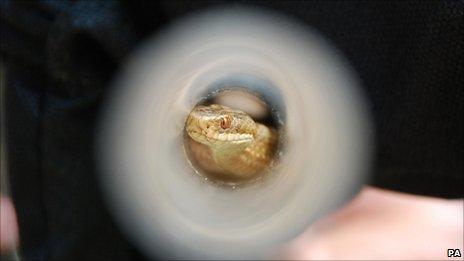Experts DNA test England's adders to help halt decline
- Published

Each adder is placed in a plastic tube to measure its length and protect the handler from the reptile's bite when the DNA swab is taken
Ecologists are running DNA tests on adders to check their genetic diversity amid fears the UK's only venomous snake is vanishing from the wild.
A recent study found that numbers of the reptile had declined since 2007.
Conservationists believe inbreeding in small, isolated populations could lead to a further decrease in numbers.
Experts from Natural England, the Zoological Society of London and Oxford University are taking swabs from the reptiles at 16 sites across England.
Ecologist Nigel Hand has already carried out health checks and collected DNA samples from five snakes at a Surrey Wildlife Trust site and 27 adders from an area in Norfolk.
Once captured, the reptiles are placed in a plastic tube to measure their length and protect the handler from their bite.
A swab is taken and they are marked before they are released back into the wild.
The DNA is then analysed to see whether larger or smaller populations have different levels of genetic variety.
Jim Foster, of Natural England, said: "With around a third of adder populations now restricted to isolated pockets of habitat, and with only a handful of snakes per sites, they could be especially vulnerable."
It is estimated that there are 1,000 populations of adder in the country with some groups made up of fewer than 10 adults.
Mr Foster said the tests would also help them understand why some adders had been found with abnormalities including malformed scales and missing eyes.
He added: "In the longer term, the last resort option is whether we should move animals between populations, artificially encouraging them to mix."
- Published21 July 2010